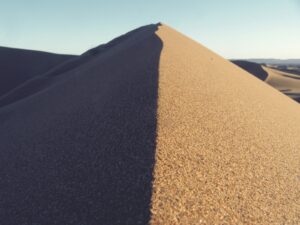Subscribe to the Newsletter
If you are interested in understanding how Traditional Chinese Medicine can improve your life sign up to my newsletter for the latest updates.

Key Learning Points
Blood – spelled with a capital B. That capital ‘B’ is important!
The red stuff (spelled with a small ‘b’) in your arteries carries food and rescue missions for your body. That’s the Western medicine view of it! But as you’ll discover, the Chinese medical view goes much further.
It takes a lot of food to create blood, so please take care of your limited supplies (typically you only have about 8 pints of it – just under 4 litres) and do respect your body’s ability to manufacture it.
Apart from food, you only get more by transfusion: someone else makes it. They give it. Lucky for You! Take care of it!
The Chinese believe everything is energy – Qi. In terms of importance Chinese medicine puts this (capital B!) Blood fluid on a par with Qi.
There’s a lot of theory wrapped up in it, which is why, as you go down this page, you’ll find more and more concepts are drawn into the web.
So if it (Capital ‘B’) is a form of energy, just thicker than normal energy, where does it come from?
Good food and drink, specifically blood building foods, (not all of them are Meat) are turned into food essence by your Stomach and Spleen, with the help of Ming Men Fire supplied by your Kidney.
That means that you must start with good nutrition: fresh food from good sources, preferably uncontaminated by chemicals or additives, preservatives, fungicides, herbicides and so on; properly cooked and eaten sensibly and often enough.
However, too many blood Building foods will need other Blood Clearing foods to balance them.
Chinese medicine can do a great deal to enhance your digestion, but in some conditions you may need supplements: intense sporting activity, pregnancy and ageing (when your digestion gets inefficient and your teeth let you down) for example.
This ‘food essence’ then goes to your Lungs to add Air Qi. So clean air and good breathing habits enhance digestion. Even so, it is still NOT what the Chinese mean when they spell it with a capital ‘B’.
Then the Lungs send this mixture of food essence and Air Qi to the Heart. There, with more help from your Kidney energy in the form of Ming Men Fire and a vital addition, Jing Essence, it becomes Blood.
At last! Built with a capital B!

The Chinese think that Blood is the foundation for your consciousness. As such (spelled with a capital ‘B’) it contains Qi, giving you life, consciousness and memory. If you like, it’s where you – the person you think of yourself as being – live.
How can we understand this? Obviously your brain won’t function without it, so from a Western scientific viewpoint, if you don’t have enough, you’ll have no consciousness.
But, in the Chinese sense, it goes further than that. Symbols have meanings and Fire is an old symbol for life and vitality. In one discussion, a doctor said that Fire is transformed into Blood in the Heart. (Tang Zong Hai, Discussion of Blood, 1884).
So your life and vitality – your Fire, which is very Yang – is transformed into Blood, a very Yin substance. If someone is deficient in it, treatment must be considered for Stomach, Spleen, Kidney – Ming Men or Jing Essence, Lungs, and Heart. And that’s assuming that your Liver qi is flowing freely! (For more on what happens when your Liver stops flowing, click here!)

It (capital ‘B’) is used to nourish and moisten your body and its various forms such as your hair, nails, skin, muscles, tendons, flesh, foetus and so on.
For example, one form, Liver Blood, nourishes and moistens the eyes, the hair and the tendons, making for good eyesight, shiny healthy hair and strength and flexibility.
The Chinese also say that the Liver ‘houses’ it. This means that when it circulates it nourishes the muscles and tendons. When you rest (in particular when you lie down), your Blood returns to and rests in the Liver. In the Liver it regenerates. (More on this below.)
Without enough rest, especially as in sleep, it won’t be able to regenerate properly and you’ll begin to develop signs of Liver Blood deficiency. Read our page on Sexual Impotence for another possible consequence.
What then? Well, your eyes will lack moisture and accommodation (they’ll tire quickly and you won’t be able to focus so well), you’ll find your hand-grip less certain and walking won’t be so comfortable. Foot pain can occur because the tendons holding your bones in place lose their grip. Then your toe joints will fall out of place making walking painful.
A woman’s Liver Blood supplies her uterus and foetus. When Liver Blood is deficient her periods may be scanty, and there may be Liver Qi stagnation causing painful periods and irritability, headaches often at her vertex – the top of her head – and sore eyes.
Without enough of it to nourish the uterus, fertility may be reduced or the foetus may lack nourishment, so may not grow properly.
But more than that, the ancient Chinese said, in effect, that the Blood is the Mind – it is where our consciousness resides.
If Qi Stagnates, and goes on stagnating, eventually Blood will stagnate too. This is a frequent and important cause of Blood problems. Japanese acupuncture theory has its own view on the importance of Blood Stasis, which they call Oketsu. They regard it as vitally important to clear Oketsu if the body is to regain health.
Since the Heart governs the Mind, with this form of deficiency you can get uneasiness without obvious reasons for it, restlessness, mild irritability, poor memory, insomnia (including difficulty falling asleep), dizziness, easily startled and palpitations, and a dull-pale complexion.
Also, without regenerating it through good sleep, you’ll lose vitality in your thinking and creativity.
What happens then? After a while of continually limited sleep, you may find your mind wanders more easily, you’re more absent-minded, you have episodes of forgetting what you were going to say, you lose things more easily.
If your work requires creative thinking, as a writer, artist, composer or even administrator, or when dealing with difficult people, you won’t find you have the same resources and buoyancy as you relied upon previously.
And if you’re a fighter, you’ll lack speed and co-ordination and the ability to out-think your opponent. You’ll have lost your ‘spark’.
That’s what is meant by Consciousness residing in the Blood: if it is deficient, so also will be the sparkiness – Fire!- of your Consciousness.
With this, which could happen because of a poor diet, poor digestion, over-use of your eyes (see below) or because of lack of rest – especially lack of restful sleep – your sinews will lose their strength, your hair will lose its shine, your eyes their power, your joints their suppleness.
On that question of sight, Chinese medicine has various sayings based on observations over millennia. One of them is this: excessive use of the eyes injures the Blood.
You might think that if you’re awake with your eyes open, it would be quite hard not to use your eyes all the time, so what do they mean by ‘excessive’ use of the eyes?
In this context, they mean that staring for too long or straining the eyes injures it.

Nowadays, many of us spend huge amounts of time staring at computer, smartphone, cell-phone and television screens and in reading texts either online or on paper.
Often this means our eyes hardly need to change their focus, their range of movement is limited, and the range of colours they look at are limited.
What About Me?For instance, as I type this, I’m facing a white screen with black lettering on it. There are almost no other colours. I’m staring pretty fixedly at this screen too and I look to left and right hardly more than I might were I reading a book. Not good! I should get a up and walk around a bit and/or look out of the window periodically. |
Formerly our eyes were adjusting to changing conditions in focus and accommodation, colour and movement, all the time.
Fixed focus (as on a screen) isn’t what they were built for. They can do it, but it’s a bit like repetitive strain injury (which, by the way, is often also diagnosed in Chinese medicine as a form of stagnation which is more likely to occur with Blood deficiency): they wear out faster.
If your work or play means you stare at screens or paper all the time, take care! Not just your eyesight is at risk, but also your general health, through this form of damage.

Take regular breaks (Hint! Use a timer! Every 30 minutes!) from your work or play, make your eyes focus on different things, on colour and moving objects in the real world.

Stay in Touch!
No spam, only notifications about new articles and updates.

Book a Video consultation if you want to know more about your symptoms
Blood Stasis is a huge cause of ageing, so of course we’re all interested in how to manage it!
But it’s far more than that. Every chronic disease or condition almost certainly contains this form of Stasis.
Unfortunately it’s not always easy to cure. Even so one must treat it if the patient is not to deteriorate.
With Heart Blood Stagnation (which can come about from a variety of reasons) there will be severe anxiety, with growing agitation, more palpitations, and pains in the chest with a sense of oppression.
When asleep, the Mind is said to rest in the Blood. So with Blood deficiency, the Mind can’t settle, can’t get to sleep or has restless dreams and can’t achieve deep restful sleep.
If insomnia occurs because of this form of deficiency, then tranquillisers may put you out but they won’t always make you better: treatment of your Blood is needed. (Tranquillisers might even make you worse because your deficient body has an extra job to do, as it tries to cleanse your body of the drugs.)
(Technical stuff! Actually Dryness also comes under what are called ‘Body Fluids’ which, for health, must be pure and unsullied. This paragraph on dryness includes some of those ideas.)
Fluid and nourishing, containing water and oils, it moistens and fills out flesh and body spaces wherever it goes.
Healthy young people have an abundance of it, and you see it in their smooth rounded contours and colourful complexions.
Entrepreneurs make fortunes from creams, oils, nutroceuticals, vitamins, minerals and injections. All claim to help our bodies compensate for this form of deficiency.
So skin dryness often comes from this kind of deficiency – hence many forms of eczema. Equally …

When sustainable life first starts in the body, it does so when a newly fertilised egg attaches itself to the wall of the mother’s womb. Nourishment from the mother feeds the egg which becomes the foetus as it grows to become the baby.
This important process comes partly under what is called Chong Mo. Chong Mo has many vital functions in nourishing the baby. Later it shows the body how to sustain itself.
When Chong Mo doesn’t function properly, you get problems of circulation and fertility, and in the abdomen, chest and throat.
Importantly you also get – potentially – lifelong attitudes which one might describe as ‘fearful’.
Practitioners of acupuncture and Chinese medicine are often in demand for their ability to enhance the way the body produces this vital substance.
However, treatment is only half the battle!
Patients need to recognise how their actions or in-actions contribute to their problems. Of course, governments also want their people to be healthy, because that reduces costs and increases their people’s ability to work, defend and produce the country’s needs.
For individuals, on one hand this requires an element of self-discipline or denial. On the other hand we must find, prepare and properly eat better foods. Chinese medicine emphasises life-education.
Of course, many other factors contribute to how people manage themselves including, but not limited to:
The other main forms of this disharmony:

This Introductory Chinese medicine course introduces you to the amazing thinking behind this ancient medicine, now increasingly in demand.

The Scottish College for Chinese medicine provides introductory courses for all, explaining Chinese medicine and its cultural background.

Master Tung’s acupuncture is a hidden treasure, lost to China but recovered in Taiwan from where it spread round the world.

Knee pain has five main causes. It’s certainly worth trying acupuncture before you resort to surgery!
Subscribe to the Newsletter
If you are interested in understanding how Traditional Chinese Medicine can improve your life sign up to my newsletter for the latest updates.
Subscribe to the Newsletter
If you are interested in understanding how Traditional Chinese Medicine can improve your life sign up to my newsletter for the latest updates.
2 Responses
Do the quantity and quality of Blood (TCM concept) depend on blood (Western concept)? Say, if a person has a congenital form of anemia (not curable), does that person have necessarily a Blood deficiency? Thank you.
Hi don-hi
The asnwer depends on how rigidly you interpret the symptoms. Probably anaemia does mean there is Blood deficiency, but there are ‘given’ symptoms for the latter so, unless fulfilled, strictly speaking there would be no Blood deficiency. But when diagnosing it, it’s nearly always diagnosed in more specific terms, such as Liver Blood deficiency, or Spleen deficiency and so on.